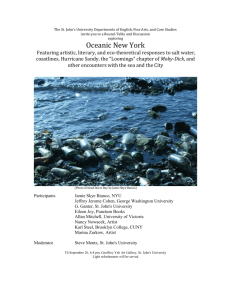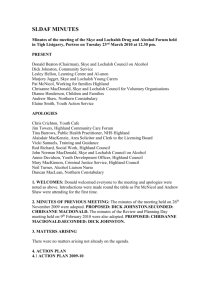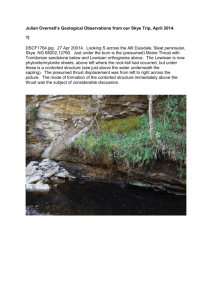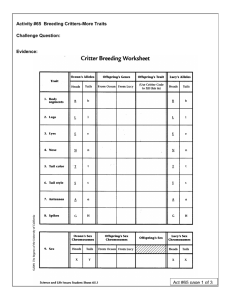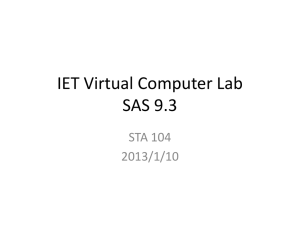Steering Group Summary Notes 19th Feb 2013
advertisement
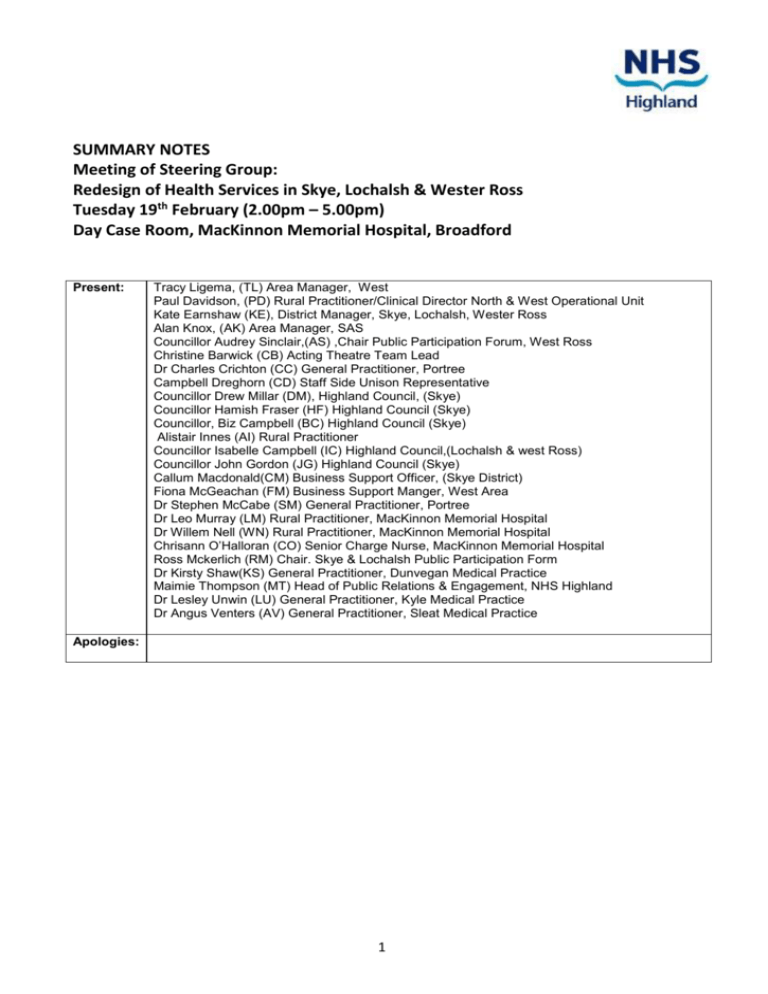
SUMMARY NOTES Meeting of Steering Group: Redesign of Health Services in Skye, Lochalsh & Wester Ross Tuesday 19th February (2.00pm – 5.00pm) Day Case Room, MacKinnon Memorial Hospital, Broadford Present: Tracy Ligema, (TL) Area Manager, West Paul Davidson, (PD) Rural Practitioner/Clinical Director North & West Operational Unit Kate Earnshaw (KE), District Manager, Skye, Lochalsh, Wester Ross Alan Knox, (AK) Area Manager, SAS Councillor Audrey Sinclair,(AS) ,Chair Public Participation Forum, West Ross Christine Barwick (CB) Acting Theatre Team Lead Dr Charles Crichton (CC) General Practitioner, Portree Campbell Dreghorn (CD) Staff Side Unison Representative Councillor Drew Millar (DM), Highland Council, (Skye) Councillor Hamish Fraser (HF) Highland Council (Skye) Councillor, Biz Campbell (BC) Highland Council (Skye) Alistair Innes (AI) Rural Practitioner Councillor Isabelle Campbell (IC) Highland Council,(Lochalsh & west Ross) Councillor John Gordon (JG) Highland Council (Skye) Callum Macdonald(CM) Business Support Officer, (Skye District) Fiona McGeachan (FM) Business Support Manger, West Area Dr Stephen McCabe (SM) General Practitioner, Portree Dr Leo Murray (LM) Rural Practitioner, MacKinnon Memorial Hospital Dr Willem Nell (WN) Rural Practitioner, MacKinnon Memorial Hospital Chrisann O’Halloran (CO) Senior Charge Nurse, MacKinnon Memorial Hospital Ross Mckerlich (RM) Chair. Skye & Lochalsh Public Participation Form Dr Kirsty Shaw(KS) General Practitioner, Dunvegan Medical Practice Maimie Thompson (MT) Head of Public Relations & Engagement, NHS Highland Dr Lesley Unwin (LU) General Practitioner, Kyle Medical Practice Dr Angus Venters (AV) General Practitioner, Sleat Medical Practice Apologies: 1 Summary Notes 1 Welcome and Apologies Dr Paul Davidson welcomed everyone to the inaugural meeting of the Redesign of Health Services in Skye, Lochalsh & Wester Ross steering group. 2 Current position and background PD gave an overview of the current position in relation to hospital and community services and the need for change. One of the main remits of the steering group would be to generate focus around engagement and to take forward the project initiatives. It will be important for the group to progress the case for change A further aim for the group will be to improve the future vision that will be sustainable into the future. PD highlighted that in previous discussions it had been divisive due to focussing around the site, and therefore it was important not to do this. Why do we need to do this? • The current provision is not fit for purpose and has potential to harm. • Capabilities- 2 hospitals with different services, facilities and 2 groups of staff • Standards • Financial burden, e.g maintenance backlog , fuel costs • Aging community • Staying the same will result in service downgrading There are considerable threats to some of our existing services e.g diagnostics and theatre, radiology and ultrasound. Due to the change in demographics we are aware we cannot go on the same way, so we need to change the way we deliver healthcare provision locally through a safe and modern facility. Appendix 1 –Project Charter Currently no pharmacy support across two hospitals, limited technology no Wi-Fi, PD highlighted emergency and elderly care is our future. It will be important to create a vision statement that supports the future services for our area. We have opportunities • To design a modern purpose built facility • Plan for future and current needs. • To be efficient in service delivery and energy use • Safe • Links with a community integrated approach • Pharmacy, Rehabilitation, use of technology • Need to build in the specification for areas that we are currently challenged with • To create an educational hub We need to create a Vision Statement and agree the vision where we get to the point where Hubco can take over to move towards an Initial Agreement. (IA) 2 Scottish Government Investment Manual Process TL explained the Scottish Government Investment Manual which was the process in which we are to develop our case for change. This includes four stages: An Options appraisal The initial agreement Outline business case Full business case We will be allocated Scottish Government Business Support from April 2013. This Project Manager will support the delivery of the options appraisal initial agreement. We have to demonstrate we have looked at all the options to prepare for the initial agreement. Scottish Government Investment Manual requires us to evidence broad thinking initially, and no options are ruled out, including those that may appear extreme or obvious. This is part of a bigger piece of work in partnership with Badenoch & Strathspey. They are undergoing a similar process and in order to ensure this is a viable investment, the two projects will be developed in parallel. The timescales for this process are very tight, but still to be confirmed. Terms of Reference The Terms of Reference paper was discussed, and it was agreed to include the Team Manager for Social Work and an Estates Manager in the membership. Maimie Thompson will draft a note to all to explain the Hubco process and a explanation of the Hubco/Scottish Capital Investment Manual process. Communications MT gave an overview of the communications process and remit and focus of the group MT highlighted that we would need to have:• Clarity of purpose and process • Engender good relations and trust within the group. • Need for clinical engagement and leadership for political consensus. • Ensure everyone is fully familiar with timeframes and role and remit of the group • Important to have consistency of messages. • Need to have clarity on the role of Hubco • Need to ensure that we have a process to deal with unexpected incidents, and how to manage conflict. A media release summary of the discussions and agreements to be drafted by MT or representative. Develop positive relations with the press, communications should be little and often Important to identify different groups to communicate with, needs to be reasonable. Managers need to be out and about, attend Community Council meetings, GP Practice meetings. The proposal will not please everybody, therefore we need to ensure we did everything reasonable that we could. It is a big responsibility of everyone on this group to progress this positively. 3 Breakout Group sessions Group 1 - Single Site Services, facilitated by PD Group 2 - Community Services, facilitated by KE Group 3 - Connections: Transport/Technology, facilitated by CM Appendix 2 Feedback Summaries Gill McVicar, Operational Manager had previously advised managers on the need for public engagement and that the initial process be completed by the end of March. There will be more engagement for the Initial Agreement starting in April with project support from the Scottish Government. Timescale for completion of the project is 2- 3 years. The meeting closed. 4 Dates of Next Steering Group Meetings: Tuesday 19th March 2013: Meeting Room, Portree Hospital Tuesday 16th April 2103: venue to be confirmed Tuesday 14th May 2013; venue to be confirmed Tuesday 11th June 2013: venue to be confirmed 5 Dates of Next Core Group Meetings: Wednesday 6th March 9.00am (Before SMT Meeting) 4 Single Site Facility Process Owner Kate Earnshaw Clinical Service / Service Lead Paul Davidson Rachel Hill; Clinical Effectiveness Manager Position Statement • • • • • • Executive Lead Tracy Ligema Existing hospital facilities in Skye & Lochalsh are not sufficient to deliver appropriate levels of healthcare services - Why? - Current provision is based on historical exigencies, going back to the 1960s. - People understand need for and benefits of hospital services from one site, but community so far unwilling to compromise or give. The current hospital facilities in both Portree and Broadford require significant upgrading to meet the robust clinical standards necessary of modern healthcare facilities. Despite considerable investment over the years the ergonomics of the buildings are not conducive to achieving this. The current facilities are potentially causing harm to patients as we will never be able to meet the quality and clinical standards expected The current facilities are not efficient or cost effective to maintain There is a strong possibility that we will lose services as we cannot meet the clinical quality standards which may lead to an enforced down grading of our local facilities. As a result of this, there would be a strong possibility that we will loose highly trained and qualified clinicians. Benefits / Patient / internal impact Goals • • • • • • • • • • • A modern quality health care facility Enhanced clinical facility and healthcare hub for the area Retain local services and develop opportunities to improve local options Retain well qualified personnel Enhanced partnership working with other health and social care providers Sharing of skills and expertise Patient safety and quality maintained. Unscheduled care services maintained across the area. Pursuit of NHSH Quality Approach and reduction of avoidable harm Key Performance Measures • • • • • • Baseline Target Key Performance Indicators – for development project - • • • • Steering group convened Needs assessment carried out Delivery of case for change Progress towards Initial Agreement A modern single site hospital designed to meet the clinical needs. Identifying/agreeing site – following needs assessment/feasibility study. Political/managerial commitment – Discussions with local stakeholders e.g. elected members, MSPs. Identify resources and timescale. Merging two sites’ services in advance of a single site. To update the District Partnership and Ward Forums. To engage with the wider public To complete a clinical brief, feasibility study and needs assessment by July 2013, preferably using an outside agency to ensure independence of review. 5 Actual Comments Appendix 2 Skye and Lochalsh Single Site Hospital Working Group – 19 Feb 2013 Workshop No 1 Single Site Hospital Services Attendees: Dr Paul Davidson, Rural Practitioner/Clinical Director (facilitator) Dr Charles Crichton, GP Portree Medical Practice Dr Leo Murray, Lead Clinician, MMH Dr Wil Nel, Rural Practitioner and Endoscopist, MMH S/N Christine Barwick, Acting CN Theatres, MMH Maimie Thomson, Head of Engagement, NHS Highland The group discussed the following aspects of clinical care which should be considered as applicable to all age groups: Acute Care Outpatient o Ambulatory care (minor illness/injury) o Primary care OOH (including a visiting service) o A+E level care (minor to major trauma) o Stabilisation and transfer service (including escorted transfers) o Custody and minor forensic service for Northern Constabulary o Assessment of psychiatric patients (liaison with MHO/New Craigs) o Advice/assistance for Midwifery Patients Inpatient o Non-operative surgical assessment and inpatient care o Medical assessment and inpatient care o Paediatric assessment and short term care (liaison with Raigmore) o Support for community midwifery unit (incl. Neonatal resus) o Place of safety for acute psychiatric evaluation Elective Care Outpatient o Visiting consultant/service area for various clinics o Local clinics (fracture, minor ops, substance misuse, alcohol, pre-op assessment, review) o Chemotherapy (nurse led, doctor supported) o Physiotherapy o Occupational Therapy o Midwifery (antenatal/post delivery) o Dietician o Community Nurse/GP liaison Inpatient o Step down from Raigmore/Other o Pre/Post investigation o Palliative care o Rehabilitation/Re-enablement o Longer duration chemotherapy o Alcohol detoxification The group acknowledged that to provide the above the following diagnostics would be required: X-ray facilities – suitable for A+E care (CT scanner becoming essential) Ultrasound (weekday service) Near patient testing / lab services Diagnostic scope (UGIE/Colonoscopy/Flexible Cystoscopy) Suitable diagnostic provision for A+E including slit lamp/A+E ultrasound All services require appropriate staffing and surroundings with a view to no less than current total Skye bed complement, although acknowledgement that if single/en-suite adopted this would allow greater bed efficiencies. 6 Skye and Lochalsh Single Site Hospital Working Group – 19 Feb 2013 Workshop No 2 – Community Services Attendees: Kate Earnshaw, District Manager SL&WR (facilitator) Dr Angus Venters, GP CClr Biz Campbell Dr Steve McCabe, GP Tracy Ligema, Area Manager Community Services Feedback Current community service provision – please refer to attached slides. The group discussed the future vision: For community services to be integrated in the community resource “hub” with in-patient and out of hours care. Staff who could be flexible across services. To access opportunities to co-locate but to acknowledge that there will need to be accessibility across the geographical area. To support the development of extended primary care teams e.g. GP practice integrated into the community hub. To ensure our 3 community nursing Teams link closely with EPCT and Hospital provision o North Skye NE Skye NW Skye Raasay o South Skye and Lochalsh South Skye Mainland o South West Ross Lochcarron Torridon Applecross For a physiotherapy and OT hub based in the new resource centre but to enhance provision in patients homes To develop appropriate rehabilitation services o Cardiac o Pulmonary To have our Social Care teams based in the community resource o Social Work o Care @ Home Podiatry services were felt to be effective under the current model e.g. clinic based in practices and health centres Scottish Ambulance Service must be part of the Extended team with the site to support partnership approaches to delivering care Support Services could be based on the site e.g. o CAB o Counselling Services o Training and Education Facilities – both staff and for the public – taking forward a population health approach Beds and spaces – need to think about intermediate beds and or step up step down facility Midwifery CAU Radiology/Sonography provision – CT Scanner Out of Hours provision – must be available across the area – MDT approach e.g. Rural Practitioners, Nurse Practitioners, Basics Doctors, First Responders Mental health Services – this is an opportunity to develop:o Drug and Alcohol Clinics/Services o Recovery Services o Place of Safety 7 Throughout the conversation we highlighted the importance of transport: Public Transport needs to be strengthened Hospital Car Partnerships with other providers e.g. Red Cross, Community Car Schemes Skye and Lochalsh Single Site Hospital Working Group – 19 Feb 2013 Workshop No 3 – Connections: Transport/Technology Attendees: Cllr Hamish Fraser, The Highland Council Cllr Audrey Sinclair, The Highland Council Alan Knox, Scottish Ambulance Service Callum Macdonald, NHS District Office (facilitator) The group discussed: Parking Adequate, future-proofed parking must be provided, bearing in mind that many staff, patients and visitors may choose to travel to the site by private motor vehicle. A separate area should be provided for staff parking and a further area identified for SAS parking. Deliveries An access route and unloading area should be provided for service deliveries, NHSH delivery and maintenance vehicles and oil and gas tankers supplying goods and services to the site. Public Transport Any new site must have direct access to/from public transport and a dedicated bus stop and turning area/through road identified to facilitate these services. It was recognised that local subsidies are difficult to access at the present time and any subsidy has to be justified in terms of usage and need. Options such as a Community Car Scheme, SAS Patient Transport or other ways of achieving improved patient and public transport links to/from the site need to be investigated. It was acknowledged that negotiations with funding bodies would be made easier if there was one site. The group thought that provision of public or other form of transport to/from the site was very important in trying to “sell” the idea of a single site to members of the public when a specific location had been agreed. Patient Transport It was felt that this needs to be integrated with ambulance services in terms of co-ordination and availability. Forthcoming development of services from SAS crews will perhaps improve the co-ordination aspects of patient transport. It was acknowledged that the current lack of public transport makes SAS Patient Transport a vital service for an area such as Skye, Lochalsh and South West Ross. Air Ambulance The working group would review potential mobile air ambulance landing site(s), this would of course be based upon where the new facility site is going to be located, and assuming that new facility location would have an adjoining dedicated permanent helicopter landing site on the proposed plans. Once potential landing site(s) have been identified, a further request to Air Ambulance Team / MOD for site assessment for medical evacuations in day time & night time operations would be made. Suitable organisations are identified, e.g. Coastguard / Fire & Rescue Service for managing night time mobile lights and MOUs are developed and training is delivered Local SAS A single site with appropriate facilities is very important to the SAS in terms of costs, skills and equipment. There was an acknowledgement that the local ambulance service needs to be better integrated and local personnel trained and up-skilled. Benefits in terms of education, clinical pathways, clinical standards and infection control would flow from a single site with good communications and facilities for crews. There would still be a need for other bases throughout the area but a central or dedicated site would enable better co-ordination, education, team-working and morale. The SAS in South Skye and Lochalsh will be based in Mackinnon Memorial Hospital in the coming months and would obviously be looking to re-locate to the new single site when this has been identified and built. Information Technology (IT) As more and more technological developments and equipment comes on stream it is vital that internal and external communications are improved in terms of better broadband, satellite, N3 connections. Telehealth will play an increasingly important role in the future and the SAS representative gave an interesting insight into planned current and future developments in terms of preventive and proactive care for patients in their own community or in their own home. Good access to faster communications would enable SAS personnel to access their learning system (ATSAS) to develop or improve skills and knowledge. Compatible systems can lead to less paper and more “on-line” information and services. IT Equipment 8 It was recognised that modern, up-to-date hardware and software was available and that there be a rolling program of renewing and replacing these systems and hardware to ensure that work and services are delivered as locally as possible, be that in the community, in the home or on this site. Other Facilities A multi-purpose Meeting Room with Video Conferencing facilities should be built on-site. Other During the course of the workshop it was highlighted that the Working Group needs to get correct information into the public domain and that there is an urgent need to get the Press “on board”. 9
